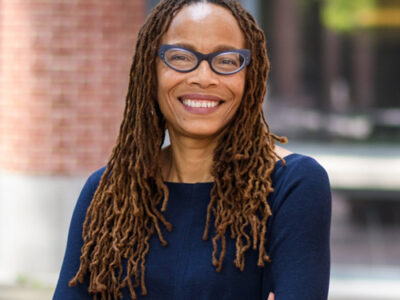
Why a “true culture change” is needed in post-Roe America.
In September the Leonard Davis Institute hosted an online panel bringing together three experts to discuss “Health Care and Abortion in a Post-Roe America.” Moderated by Courtney Schreiber, professor of obstetrics and gynecology at the Perelman School of Medicine, the conversation featured Aletha Akers, vice president for research at the Guttmacher Institute, which specializes in research and policy to advance sexual and reproductive health and rights (SRHR); Heather Shumaker, director of state abortion access at the National Women’s Law Center; and Raegan McDonald-Mosley M’03, the CEO of Power to Decide, which works to prevent unplanned pregnancies by providing accurate information on sexual health and contraceptive methods to young people.
The LDI panel touched on how the Supreme Court’s June decision in Dobbs v. Jackson Women’s Health Organization overturning the constitutional right to abortion—enshrined 50 years ago in Roe v. Wade and reaffirmed in 1992 in Planned Parenthood v. Casey—will affect individuals, families, and communities’ access to reproductive health services; how research organizations like Guttmacher will adjust their approaches to continue to collect and analyze data to inform and support SRHR; and the impacts on abortion providers and support organizations of the uncertain legal environment created by ambiguous language in state laws banning or restricting abortions.
Here are remarks from McDonald-Mosely, who highlighted the need for “a true culture change” as part of a long-term strategy to overcome and reverse the loss of Roe. (The full recording can be viewed on LDI’s website.) —JP
“Remember that because of the way that some of these laws were written, in the nefarious use of aiding and abetting clauses, many [providers and support organizations]—particularly in Texas and other states that have these clauses—have stopped operating because they are concerned about criminal charges against them. And so not only do we now have a situation where abortion provision has gone completely dark, or almost dark, in these states, the people who are generally funding and supporting and helping these people connect to care and services are also no longer operating, adding insult to injury.
So, there’s huge need there. In the short term, focusing on just whatever we can do at the community level to connect people to care and services for abortion care, and also reducing system barriers to access to contraception—those are immediate needs across the country and that’s all work that we can be doing in our own communities, our own hospital systems, in our own pharmacies, wherever we have influence.
Longer term, I think the only way we get through this and past this is true culture change to combat stigma for abortion. We have allowed abortion to be marginalized in our institutions. We have avoided talking about it. It has not been people’s primary political concern, for many of us, and now that has allowed us to get to this place. And I think the only silver lining I see in this is that we’re having more conversations about this.
We’re talking about it more in social media. Kansas [which voted in August to preserve abortion rights]—you know, unexpected win: I think it shows that people are willing to take a stand on this, but it’s not the only issue that people care about. And if someone has to sort of weigh voting on the economy or voting on abortion, that’s going to be really challenging. So I think we really need to just undo and address abortion stigma writ large across our systems, in our hearts, to get to a better place on this long term.”




